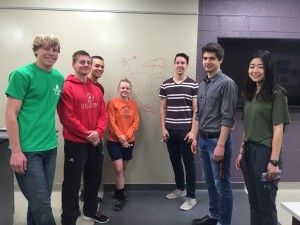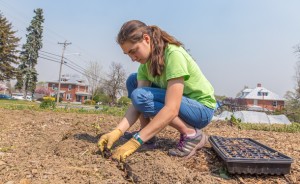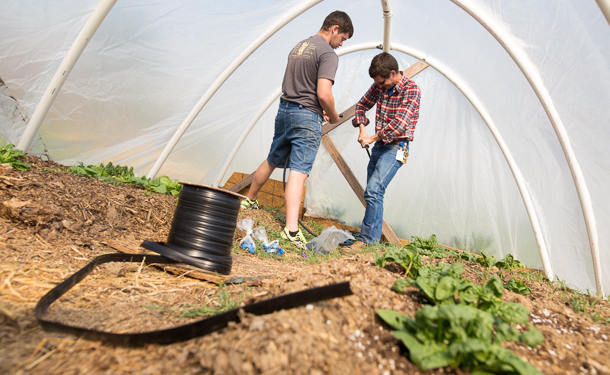Not all sustainability initiatives come from the top down at Eastern Mennonite University. Earthkeepers’ annual mini-grant competition fosters grass-roots innovation and ingenuity among the entire campus community, says club president Harrison Horst. The student-run group, which started in the 1970s, implements environmentally-friendly practices such as recycling, composting and reducing waste around campus.
“We have a great administration and staff doing a lot of great sustainability work, but that doesn’t mean there isn’t room for good ideas for sustainable improvement to sprout, especially from the student body,” Horst said. “The mini-grant competition really lives up to the spirit of organic grass-roots growth that we are modeling here. Sometimes, we don’t need a heavy document or big announcement to make our campus more sustainable.”

This year’s winners admirably fit the bill: an exercise bike that feeds volts back into EMU’s grid, drip irrigation and hoop house materials in the campus gardens that contribute to better efficiency and productivity, and a filtered water station to increase use of non-disposable bottles.
Judges looked for projects that are creative, long-term and visible and have strong educational benefit and community collaboration, Horst said. Sustainability Coordinator Jonathan Lantz-Trissel and Professor Tara Kishbaugh joined Horst in judging the six proposals from students, faculty, and staff members.
The sustainable stationary bike project, which was given $250, came about through such collaboration. Hannah Chappell-Dick and Rachel Sturm, representing Student Athletic Advisory Committee, contacted Ben Zook, with Engineers for a Sustainable World, about entering in an application for the sustainability grant.
“They needed someone to build the project and we were happy to volunteer,” Zook said, adding that the bike will be built in the fall.
One possible attraction for athletes who ride the bike for conditioning purposes is a display that “will show how much energy you are pumping back into the grid as you pedal,” Zook said. “There will also be a comparison meter to show the energy compared to a car, or a horse.”

Sustainable Food Initiative members were pleased to hear they’d been awarded a $500 mini-grant that will increase productivity and efficiency of their campus gardens, said Josh Nyce, garden coordinator. SFI has one garden on drip, but now plans to install a drip system for the remaining two gardens, as well as increase production space in the hoop house.
“This type of irrigation will make our whole operation more efficient, improve our production and yield, and allow us spend more time on other tasks and projects to hopefully grow SFI,” he said. “Watering in the hoop house will be so much easier, and will extend our growing season to provide us with fresh vegetables all year long at the SFI produce stand.”
As for the bottle filling station, library director Marci Frederick says she sees these “everywhere.”
The $250 grant will pay for a spigot on the first-floor water fountain to allow for easier filling of bottles, as well as a filtering station on the main floor.
